听力3重修复习资料
- 格式:doc
- 大小:84.50 KB
- 文档页数:22
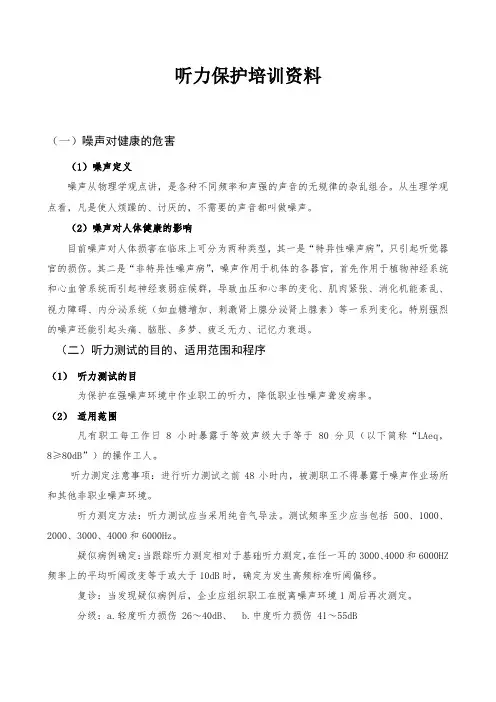
听力保护培训资料(一)噪声对健康的危害(1)噪声定义噪声从物理学观点讲,是各种不同频率和声强的声音的无规律的杂乱组合。
从生理学观点看,凡是使人烦躁的、讨厌的,不需要的声音都叫做噪声。
(2)噪声对人体健康的影响目前噪声对人体损害在临床上可分为两种类型,其一是“特异性噪声病”,只引起听觉器官的损伤。
其二是“非特异性噪声病”,噪声作用于机体的各器官,首先作用于植物神经系统和心血管系统而引起神经衰弱症候群,导致血压和心率的变化、肌肉紧张、消化机能紊乱、视力障碍、内分泌系统(如血糖增加、刺激肾上腺分泌肾上腺素)等一系列变化。
特别强烈的噪声还能引起头痛、脑胀、多梦、疲乏无力、记忆力衰退。
(二)听力测试的目的、适用范围和程序(1)听力测试的目为保护在强噪声环境中作业职工的听力,降低职业性噪声聋发病率。
(2)适用范围凡有职工每工作日8小时暴露于等效声级大于等于80分贝(以下简称“LAeq,8≥80dB”)的操作工人。
听力测定注意事项:进行听力测试之前48小时内,被测职工不得暴露于噪声作业场所和其他非职业噪声环境。
听力测定方法:听力测试应当采用纯音气导法。
测试频率至少应当包括500、1000、2000、3000、4000和6000Hz。
疑似病例确定:当跟踪听力测定相对于基础听力测定,在任一耳的3000、4000和6000HZ 频率上的平均听阈改变等于或大于10dB时,确定为发生高频标准听阈偏移。
复诊:当发现疑似病例后,企业应组织职工在脱离噪声环境1周后再次测定。
分级:a.轻度听力损伤 26~40dB、 b.中度听力损伤 41~55dBc.重度听力损伤 56~70dB、d.噪声聋 71~90dB告知:对于确诊已发生高频标准听阈偏移的职工,应当在14天内以书面形式将测试结果通知本人,并采取相应听力保护措施。
(2)噪声控制一般方法1)控制噪声源:根据噪声的性质和具体情况采取控制和消除噪声源,是从根本上解决噪声危害的一种方法。
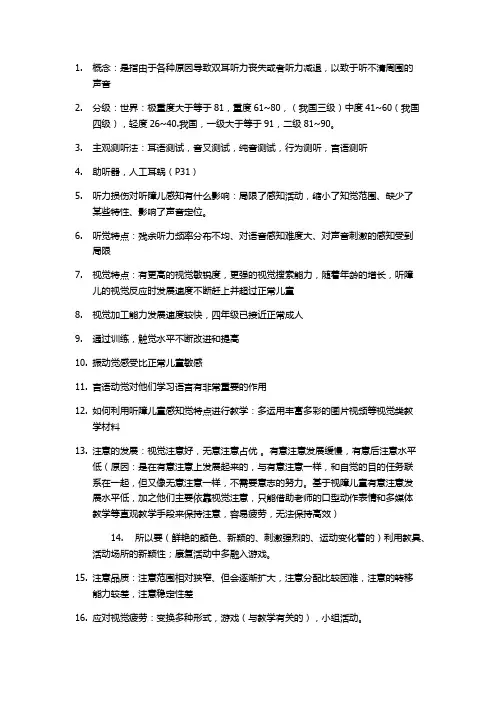
1.概念:是指由于各种原因导致双耳听力丧失或者听力减退,以致于听不清周围的声音2.分级:世界:极重度大于等于81,重度61~80,(我国三级)中度41~60(我国四级),轻度26~40.我国,一级大于等于91,二级81~90。
3.主观测听法:耳语测试,音叉测试,纯音测试,行为测听,言语测听4.助听器,人工耳蜗(P31)5.听力损伤对听障儿感知有什么影响:局限了感知活动,缩小了知觉范围、缺少了某些特性、影响了声音定位。
6.听觉特点:残余听力频率分布不均、对语音感知难度大、对声音刺激的感知受到局限7.视觉特点:有更高的视觉敏锐度,更强的视觉搜索能力,随着年龄的增长,听障儿的视觉反应时发展速度不断赶上并超过正常儿童8.视觉加工能力发展速度较快,四年级已接近正常成人9.通过训练,触觉水平不断改进和提高10.振动觉感受比正常儿童敏感11.言语动觉对他们学习语言有非常重要的作用12.如何利用听障儿童感知觉特点进行教学:多运用丰富多彩的图片视频等视觉类教学材料13.注意的发展:视觉注意好,无意注意占优。
有意注意发展缓慢,有意后注意水平低(原因:是在有意注意上发展起来的,与有意注意一样,和自觉的目的任务联系在一起,但又像无意注意一样,不需要意志的努力。
基于视障儿童有意注意发展水平低,加之他们主要依靠视觉注意,只能借助老师的口型动作表情和多媒体教学等直观教学手段来保持注意,容易疲劳,无法保持高效)14.所以要(鲜艳的颜色、新颖的、刺激强烈的、运动变化着的)利用教具、活动场所的新颖性;康复活动中多融入游戏。
15.注意品质:注意范围相对狭窄、但会逐渐扩大,注意分配比较困难,注意的转移能力较差,注意稳定性差16.应对视觉疲劳:变换多种形式,游戏(与教学有关的),小组活动。
17.记忆:瞬间记忆中形象记忆好于语词记忆、,,,短时记忆中,记忆广度狭窄,记忆容量小,视空工作记忆容量优于正常人,工作记忆中提取速度比健听人慢,长时记忆中,编码以图像编码为主,长时记忆存在记忆策略,保持总量上和听力正常的孩子相似18.思维:思维主要依赖事物的具体的形象,概念的夸大化和缩小化,不会按事物的本质分类,而是依据感知的特点,生活情境或物体的功用来分类。
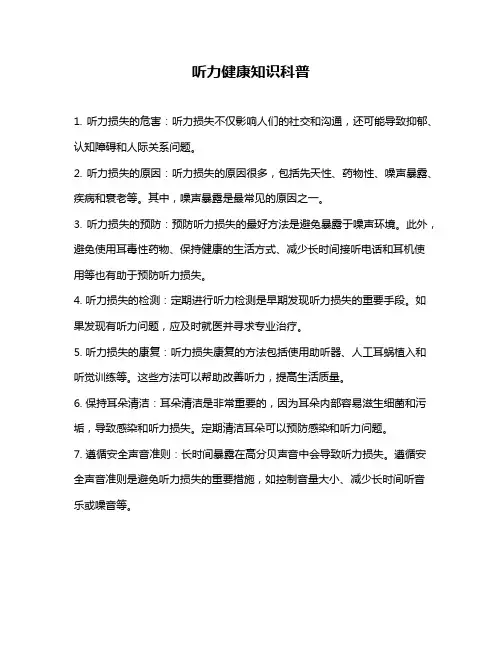
听力健康知识科普1. 听力损失的危害:听力损失不仅影响人们的社交和沟通,还可能导致抑郁、认知障碍和人际关系问题。
2. 听力损失的原因:听力损失的原因很多,包括先天性、药物性、噪声暴露、疾病和衰老等。
其中,噪声暴露是最常见的原因之一。
3. 听力损失的预防:预防听力损失的最好方法是避免暴露于噪声环境。
此外,避免使用耳毒性药物、保持健康的生活方式、减少长时间接听电话和耳机使用等也有助于预防听力损失。
4. 听力损失的检测:定期进行听力检测是早期发现听力损失的重要手段。
如果发现有听力问题,应及时就医并寻求专业治疗。
5. 听力损失的康复:听力损失康复的方法包括使用助听器、人工耳蜗植入和听觉训练等。
这些方法可以帮助改善听力,提高生活质量。
6. 保持耳朵清洁:耳朵清洁是非常重要的,因为耳朵内部容易滋生细菌和污垢,导致感染和听力损失。
定期清洁耳朵可以预防感染和听力问题。
7. 遵循安全声音准则:长时间暴露在高分贝声音中会导致听力损失。
遵循安全声音准则是避免听力损失的重要措施,如控制音量大小、减少长时间听音乐或噪音等。
8. 饮食与听力健康:饮食对听力健康也有影响。
富含维生素和矿物质的食物如绿叶蔬菜、坚果和鱼类等有助于维持良好的听力。
而高脂肪和高糖食物则可能对听力产生负面影响。
9. 远离耳毒性物质:某些物质如某些抗生素、重金属和化学物质等可能对听力产生毒性作用。
应避免长时间或大量接触这些物质,以维护良好的听力健康。
10. 关注特殊人群的听力健康:如老年人和儿童等特殊人群的听力健康需要特别关注。
老年人由于年龄相关性的听力损失较为常见,而儿童则需要关注其听觉发展。
因此,对这些人群进行定期的听力检测和干预是必要的。
总之,维护良好的听力健康需要我们注意多个方面,包括避免噪声暴露、合理使用药物、保持健康的生活方式、定期进行听力检测等。
通过综合措施,我们可以有效地预防和改善听力问题,提高生活质量。
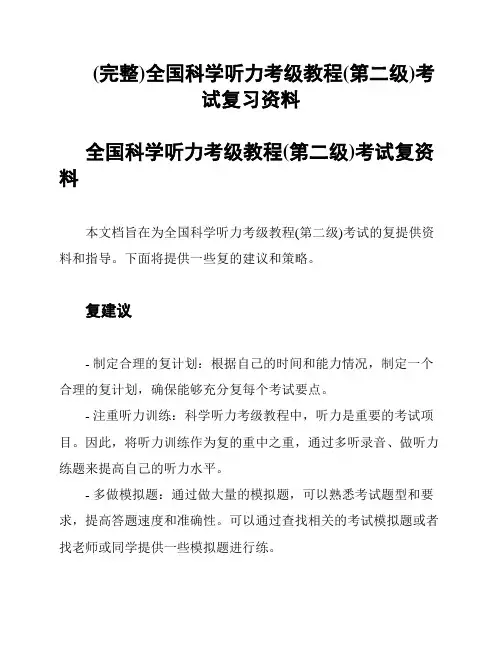
(完整)全国科学听力考级教程(第二级)考
试复习资料
全国科学听力考级教程(第二级)考试复资料
本文档旨在为全国科学听力考级教程(第二级)考试的复提供资料和指导。
下面将提供一些复的建议和策略。
复建议
- 制定合理的复计划:根据自己的时间和能力情况,制定一个合理的复计划,确保能够充分复每个考试要点。
- 注重听力训练:科学听力考级教程中,听力是重要的考试项目。
因此,将听力训练作为复的重中之重,通过多听录音、做听力练题来提高自己的听力水平。
- 多做模拟题:通过做大量的模拟题,可以熟悉考试题型和要求,提高答题速度和准确性。
可以通过查找相关的考试模拟题或者找老师或同学提供一些模拟题进行练。
- 注意重点知识点:根据考试大纲,找出重点知识点并重点复,确保对这些知识点有深入的理解和掌握。
- 制定良好的复方法:不同的人有不同的研究方法,根据自己
的情况制定适合自己的复方法,可以是记笔记、画思维导图、讲解
给别人听等方法。
复策略
- 分阶段复:将复分为不同的阶段,每个阶段专注于不同的内容,确保每个阶段的复有重点和计划性。
- 查漏补缺:在复过程中,及时查找并填补自己的知识漏洞和
不足,可以通过向老师请教、参考相关书籍和资料等方式进行补充
研究。
- 多种复方式:复不仅可以通过看书或听讲座等方式进行,还
可以通过参加讨论、做实验等实践方式进行,使得复过程更加生动
有趣。
- 合理利用资源:利用各种研究资源,如图书馆、网络、资料等,扩大自己的知识面和了解深度。
希望以上的建议和策略能对你的复习有所帮助,祝你考试顺利!。
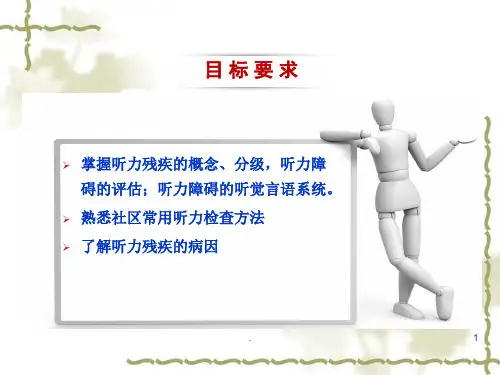
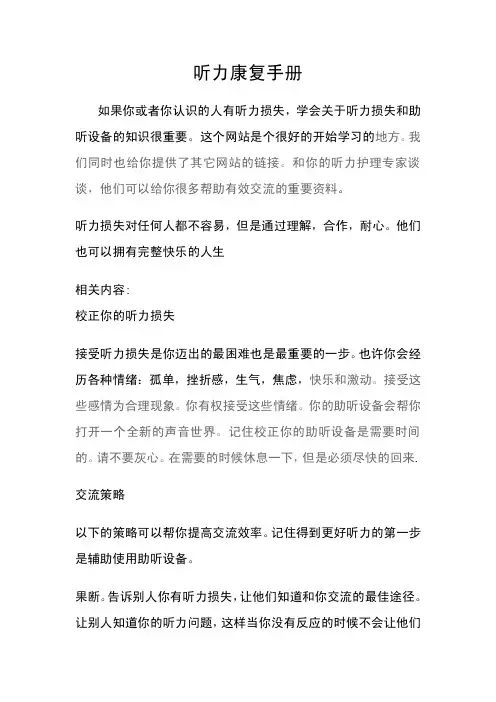
听力康复手册如果你或者你认识的人有听力损失,学会关于听力损失和助听设备的知识很重要。
这个网站是个很好的开始学习的地方。
我们同时也给你提供了其它网站的链接。
和你的听力护理专家谈谈,他们可以给你很多帮助有效交流的重要资料。
听力损失对任何人都不容易,但是通过理解,合作,耐心。
他们也可以拥有完整快乐的人生相关内容:校正你的听力损失接受听力损失是你迈出的最困难也是最重要的一步。
也许你会经历各种情绪:孤单,挫折感,生气,焦虑,快乐和激动。
接受这些感情为合理现象。
你有权接受这些情绪。
你的助听设备会帮你打开一个全新的声音世界。
记住校正你的助听设备是需要时间的。
请不要灰心。
在需要的时候休息一下,但是必须尽快的回来.交流策略以下的策略可以帮你提高交流效率。
记住得到更好听力的第一步是辅助使用助听设备。
果断。
告诉别人你有听力损失,让他们知道和你交流的最佳途径。
让别人知道你的听力问题,这样当你没有反应的时候不会让他们误解为你对他们的轻视。
重复问题并请他们注意你使背景噪声最小。
例如,在谈话中降低收音机或电视的音量,避免风扇和流水的声音靠近说话的人在人多的时候,使自己处于中心位置。
在大型的集会上如教堂仪式或演讲,坐在前面。
练习读懂演讲,这不仅包括读唇,同时也包括读面部表情和肢体语言看无声电视练习学读唇语站在可以看到演讲者的位置抓住文章的上下文关系和关键词。
通常理解会话不需要听懂每一个单词。
听演讲者的声调。
一个上升的声调表示正在提出问题请别人重复或者改述你不懂的地方咨询是否提供助听设备,如戏院,教堂等听力辅助设备有很多种的听力辅助器件可以帮你彻底改善交流和互动。
咨询你的听力护理专家推荐最适合你的系统。
环路系统使用环路系统的人,他们佩带带有电感的助听设备可以听到有麦克风收集到的特定的声音。
这个麦克风可以放在任何地方如电视机旁,靠近教堂牧师或者你工餐者的口袋里。
这些声音发送给一个放大器,然后传到到安装在室外的电线环路内(在天花板上或者的地板上的地毯下),这个环路产生一个磁场。
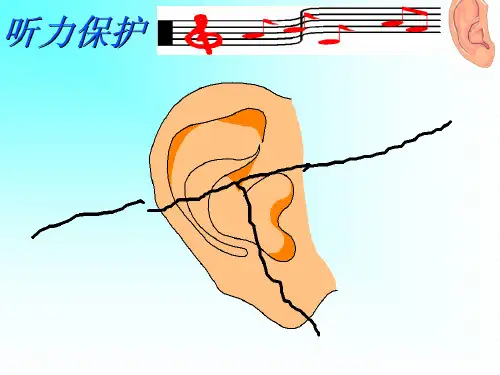
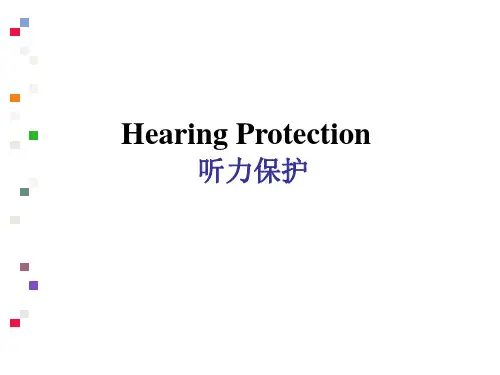

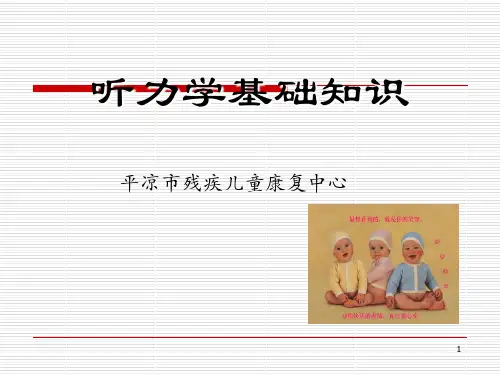
. .. . ..w.. Test-1 Part One: short conversations 16% 1. A. She decided not to come. C. She forgot to come. B. She wasn’t invited. D. She is coming earlier. 2. A. Steve looks good in anything. B. He wishes he had a jacket like Steve’s C. He knew someone who looked like Steve. D. Steve should get a new jacket. 3. A. Turn left at the traffic lights. C. Go to the right on the Green Street. B. Take the second left. D. Turn right at the corner. 4. A. The man should study harder. C. The man should not wait so long to start. B. The man is doing better. D. The man should reconsider his ways. 5. A. At a department store. C. At an office building. B. At a railway station. D. At an airport. 6. A. Boss and receptionist. C. Boss and secretary B. Manager and customer. D. Dentist and patient. 7. A. The woman will not help the man because she is busy. B. The woman will help the man later. C. The woman will help the man immediately. . .. . ..w.. D. The woman will stop to help the man soon. 8. A. The position of silverware. C. Sewing napkins. B. Setting the table. D. Doing some washing-up. Part Two Long conversations 14% Conversation One 1. A. The west of the city. C. The west of Europe B. The west of L.A. D. The West Coast 2. A. Its transportation. C. Its Suburb. B. Its environment. D. Its weather. 3. A. It was windy. C. It was cool. B. It was warm. D. It was too hot. 4. A. Golden Gate Park. C. Fishermen’s Wharf. B. The cable car ride. D. Old Victorian houses. Conversation Two 5. A. He dislikes his present job. B. He is afraid to take on a new job. C. He has no idea of how to find a job. D. He has to make a choice between two jobs. 6. A. It is more interesting. C. It is less demanding. B. It is not always busy. D. It has better hours. 7. A. He can drink coffee as he likes. B. He has already had some regular customers. . .. . ..w.. C. He likes to meet people and get to know them. D. He can prepare his own breakfast in the morning. Part three passages (choose the best answers) 20% P17unit 2 part 1 + P50unit 5 part 1, part 2 Passage One 1. A. John and Mary had two lovely girls and lived a happy life. B. John’s job was not so good and he decided to develop his career in another city. C. The couple hired a reliable woman to take care of their children before they went out. D. John and Mary came back home a little earlier than they had planned. 2. A. They were very glad to have some change in their life. B. They saw smoke somewhere in the front. C. They found the house in flames was Fred Jone’s and he was at work then. D. They could get back home earlier by taking the new route. 3. A. The house on fire is not theirs. B. John was wearing good clothes. C. Both a and b. D. Neither a nor b. 4. A. Only a part of the house was in flames. . .. . ..w.. B. They saw an old man on the lawn crying out, “The children! Get the children!”. C. They saw a woman in hysterics screaming for help. D. They saw the whole house as well as the lawn in flames. Passage Two 1. A. From their parents. B. From their parents and teachers. C. From their parents and peers. D. From their friends of the same age. 2. A. American boys and girls seldom play together. B. American boys and girls prefer to play in same-sex groups. C. American boys spend more time playing with girls. D. American boys and girls seldom play together and spend more time playing in same-sex groups.. 3. A. 8 to 10. B. 10 to12. C. 8 to 12. D. 10 to 15. Passage three 1. A. Girls love to play in large groups. B. Girls have their own favorite games. C. Girls don’t like to play with others. D. Girls love to play with boys and they usually play in small groups. 2. A. Hopscotch B. Jump rope C. Playing house D. See-saw 3. A. Both boys and girls want to get what they want. . .. . ..w.. B. Both boys and girls want other children to do what they want them to do. C. Both boys and girls try to get their playmates to do what they want them to do in the same way. D. All of the above.
Part Four Gap filling 20% P9unit 1 part 1 + P18 unit 2 part 2 Passage one The name of the project 1)___________ Students involved in the project asked to 2)_________ at 3 people and 3)________ their reaction Other people’s reaction when they saw the two homeless 4)____________ Evidence to prove that the two men were homeless and poor “dirty body” 5) _________; the blue-eyed man 6)_____________________ he had been clutching; all he ordered was 7)____ The speaker’s reaction towards the two homeless Felt a strong 8) ________________ and to 9) _____________ the